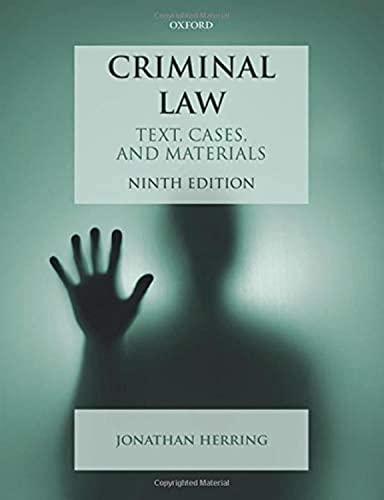Question
Question 1 (1 point) Saved The Arthur Wishart Act, provides all of the following protections to franchisees, except; Question 1 options: Failure to provide a
Question 1 (1 point)
Saved
The Arthur Wishart Act, provides all of the following protections to franchisees, except;
Question 1 options:
| Failure to provide a disclosure statement gives the franchisee the right to rescind the franchise agreement | |
| The franchisor has a duty of good faith and fair dealing with its franchisees. | |
| Franchisors are required to offer a franchisee a right of renewal at the time the franchise has expired, subject to certain restrictions | |
| Franchisors are required to give every prospective franchisee a disclosure statement at least fourteen days before the franchise agreement is signed which contains all material facts including financial and franchise information. |
Question 2 (1 point)
Saved
Constructive dismissal is defined as:
Question 2 options:
| A substantial change to an employee's job that amounts to termination | |
| is always available where the employee is asked to perform an illegal act | |
| an employee's right to terminate his/her employment if the work place poses a substantial risk to his/her health | |
| A remedy available to the construction industry under the construction lien act |
Question 3 (1 point)
Saved
Stella's employment was recently terminated by XYZ company where she served as vice president of marketing. She recently was offered a job serving coffee at Tim Horton's. Which of the following strategies is true?
Question 3 options:
| Stella is not obliged to accept the employment with Tim Horton's in order to meet her obligation to mitigate, but if she does, she must account in all wrongful dismissal action with XYZ Corp. | |
| If Stella accepts the job with Tim Horton's she has lost her right to sue XYZ Corp. for wrongful dismissal. | |
| If Stella accepts the job at Tim Horton's she is not required to account for any income earned in her wrongful dismissal action against XYZ Corp. | |
| Stella is obliged to accept the offer by Tim Horton's in order to fulfill her obligation to mitigate. |
Question 4 (1 point)
Saved
Intercoms are
Question 4 options:
| Standardized terms recommended by various organizations for commercial parties dealing in foreign trade | |
| Standardized terms mandated by government bodies for commercial parties dealing in foreign trade | |
| Are required to be used when contracting with US or Mexican entities | |
| None of the above |
Question 5 (1 point)
Saved
X entered into an agency agreement with agent Z. Z entered into a contract under seal with a third party Y. X was not named in the contract but Z described herself as "agent". Which one of the following statements is best applied to these facts:
Question 5 options:
| Y may sue X and Z on the contract | |
| X may sue Y or be sued by Y on the contract | |
| X and Y can sue Z on the contract | |
| Z may sue Y or be sued by Y on the contract | |
| X may sue Y and Z on the contract |
Provincial statutes require both an employer and an employee to follow a series of procedures designed to aid in dispute settlements, including all of the following, except:
Question 6 options:
| If the parties agree formal consent to the agreement from the provincial government. | |
| If the parties fail to agree to refrain from lock-out action until a cooling-off period has elapsed | |
| If the parties fail to agree, to submit to a conciliation procedure | |
| A genuine attempt over a specified period or time to bargain. |
Question 7 (1 point)
An agency agreement can be established
Question 7 options:
| orally | |
| by written memorandum | |
| by ratification | |
| by being written under seal | |
| all of the above |
Question 8 (1 point)
In an agency relationship the person appointing a representative is known as the
Question 8 options:
| agent | |
| principal | |
| supervising director | |
| power of attorney | |
| administrator |
Question 9 (1 point)
The Personal Information Protection and Electronic Documents Act (PIPEDA) applies to:
Question 9 options:
| Only provincially regulated organizations that collect, use or disclose personal information in the course of commercial activity | |
| allows commercial corporations to be self-regulated and voluntarily impose privacy standards on itself | |
| Every organization that collects, uses, or discloses personal information in the course of commercial activity | |
| Only federally regulated organizations that collect, use or disclose personal information in the course of commercial activity |
Question 10 (1 point)
The law of the jurisdiction in which a contract is made may determine such matters as
Question 10 options:
| the capacity of the parties to contract | |
| the legality of the contract | |
| the applicability of consumer protection legislation | |
| any terms that are to be implied | |
| all of the above |
Step by Step Solution
There are 3 Steps involved in it
Step: 1

Get Instant Access to Expert-Tailored Solutions
See step-by-step solutions with expert insights and AI powered tools for academic success
Step: 2

Step: 3

Ace Your Homework with AI
Get the answers you need in no time with our AI-driven, step-by-step assistance
Get Started


